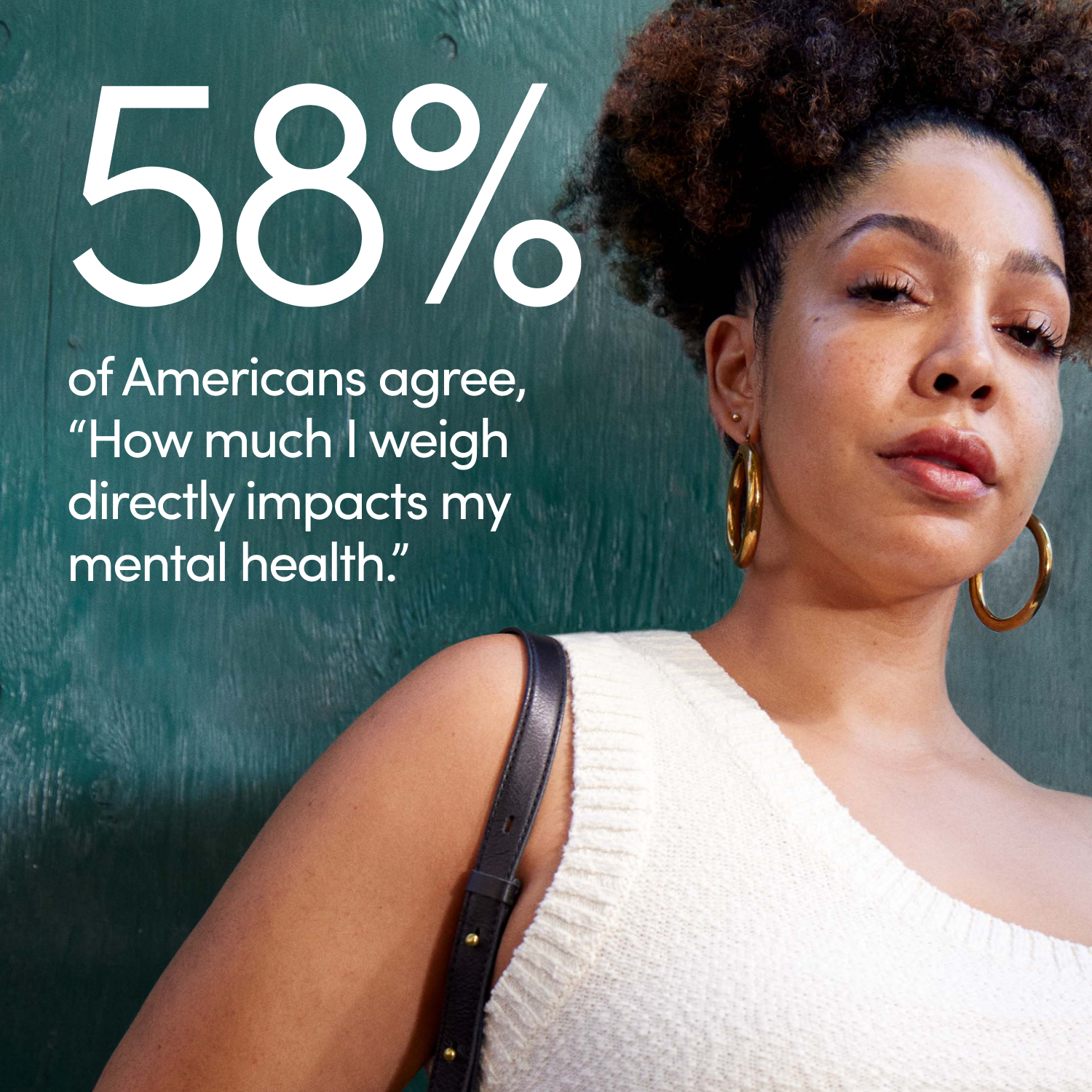Over half of Americans say how much they weigh directly impacts their mental health, according to new study

Rawpixel.com // Shutterstock
Over half of Americans say how much they weigh directly impacts their mental health, according to new study
If you've ever felt like your weight impacts your emotional well-being, you're not alone. In fact, 58% of Americans report that how much they weigh directly affects their daily mental health, according to a 2024 Hims & Hers study, The Shape of America.
Body image, scale numbers, food, and exercise can account for a huge amount of mental space for many people. So it's no surprise that research has revealed a direct link between the obesity epidemic and issues like depression, anxiety, eating disorders, and substance abuse.
When addressing weight and quality of life, mental health deserves just as much attention as physical health, especially with more than half of Americans reporting that it affects their day to day mental well-being. Hers has the latest research on this important connection, plus tips on how to protect your mental health when embarking upon a weight loss journey.
![]()

Hers
Understanding the Connection Between Weight and Mental Health
Overall, 58% of Americans reported that their weight impacts their mental health. But that number is even more staggering for younger generations, with 68% of Gen Z and millennial women noting this link. And regardless of age, 75% of survey respondents said they think about their weight on a daily basis.
When asked what impacted Americans' mental health most, positively or negatively, "my weight" was the third highest answer. It came in just behind finances and physical activity.
Food also weighs heavily on the minds of Americans—43% of Americans in the Hers study reported thinking about food (aka food noise) either often, regularly, or always. While one in 10 Americans report that there isn't a time when food isn't on their mind, respondents with obesity were 30% more likely to "always" have food on their mind.

Hers
Tips to Protect Mental Health While On a Weight Loss Journey
The good news is that as more Americans are recognizing how weight can impact their mental health, they're taking steps to feel better. 36% of the Hers survey respondents said mental health prompted their weight loss journey, and 85% said at least one major aspect of their life would improve if they lost weight.
So, whether thinking about starting a weight loss journey or already on the way, here are five tips to support your mental health and guide you through the process.
- Set realistic goals. The best way to balance mental health and weight loss goals is to manage expectations with a plan for success. Feeling content and energized in your daily life is more important than reaching a specific number on the scale, especially to sustain long-term results. Consider working with a qualified health care professional to design a weight loss strategy that's easy to stick with, and set goals that are simple to follow to stay encouraged throughout your journey.
- Reduce internal food noise. Food-related intrusive thoughts, or food noise, is when someone constantly thinks about food, whether it's planning their next meal (even when still eating) or compulsively checking food delivery apps. Making sure to eat enough to fuel the body and taking care of mental health can help. And for those taking a weight loss drug like semaglutide to quiet food noise and lose weight, understand that food noise could come back if you stop taking the medication. Consider talking to your doctor for additional help.
- Show self-compassion. For many people, perfectionism is closely tied to anxiety. Research shows that setting impossibly high standards for yourself can lead to psychological distress, but that self-compassion can reduce those negative feelings. The study cites six areas of self-compassion: self-kindness, self-judgement, common humanity, isolation, mindfulness, and over-identification with negativity. Improving each of those areas could help you feel better about your weight right now, rather than attaching positive feelings to weight loss outcomes alone.
- Try meditating. Mindfulness helps identify triggers like eating when stressed or bored. Even just a short daily meditation practice has been shown to decrease anxiety and negative moods while also improving memory and attention. That extra focus can help prioritize positive behaviors like mindful eating and movement.
- Consider therapy. Incorporating therapy as part of a weight loss plan has been shown to improve long-term outcomes in young women. This can help to address any internal issues that may be hindering weight loss while potentially improving your day-to-day mood. Cognitive behavioral therapy is a particularly effective approach for things like emotional eating. If you've never been to a therapy session before, the first meeting generally entails some introductory questions about why you decided to start therapy and what you expect from the experience.
While many people feel a connection between their weight and mental health, do what's possible to separate your overall mental health from body perception. It's important to remember that we are so much more than our bodies or a number on the scale. Prioritize both physical and mental health to feel good inside and out.
This story was produced by Hers and reviewed and distributed by Stacker.
